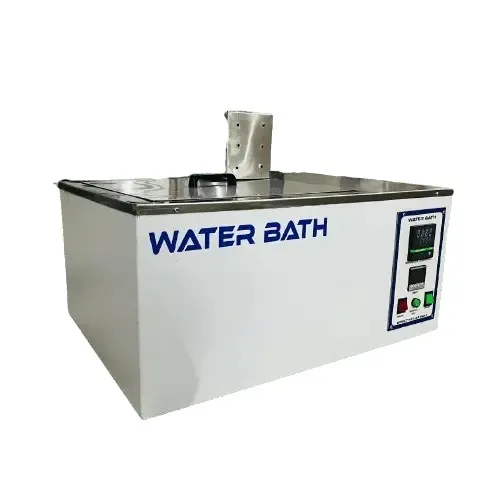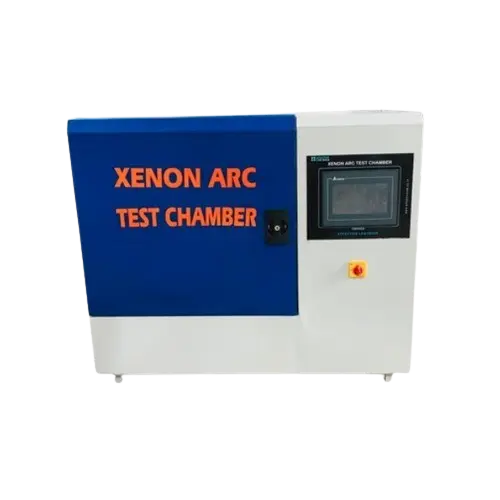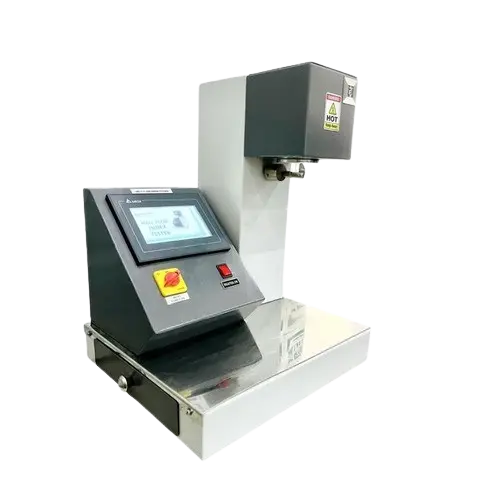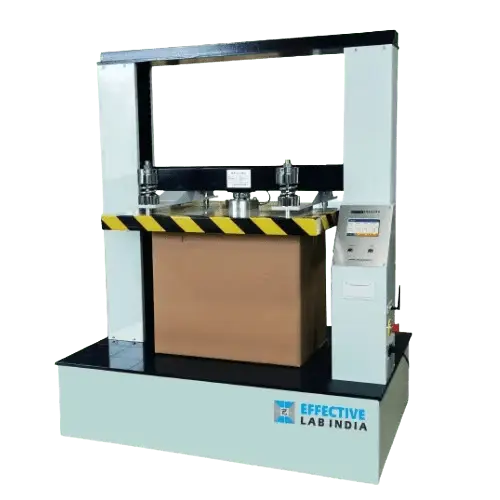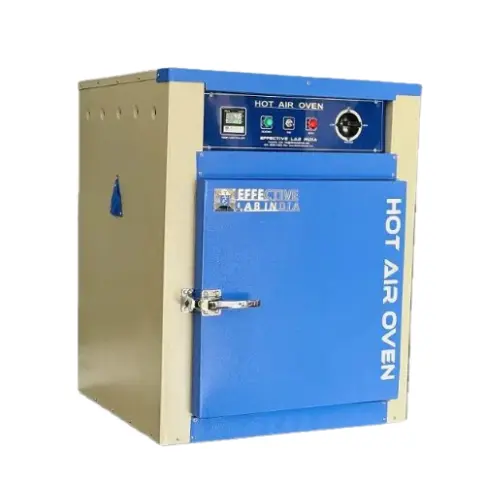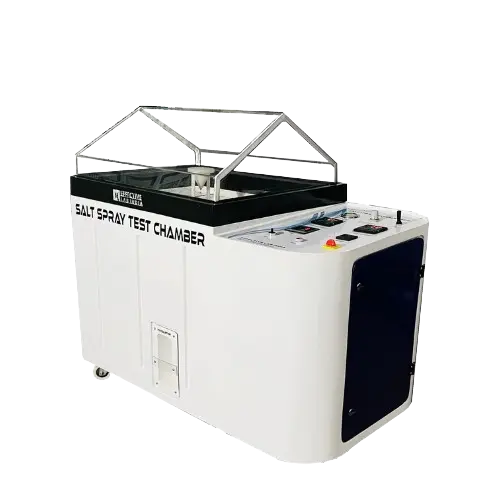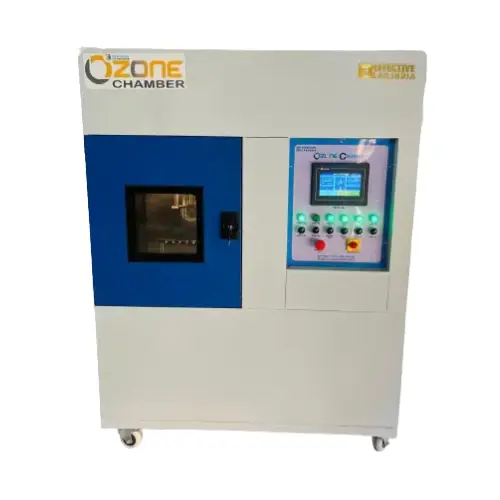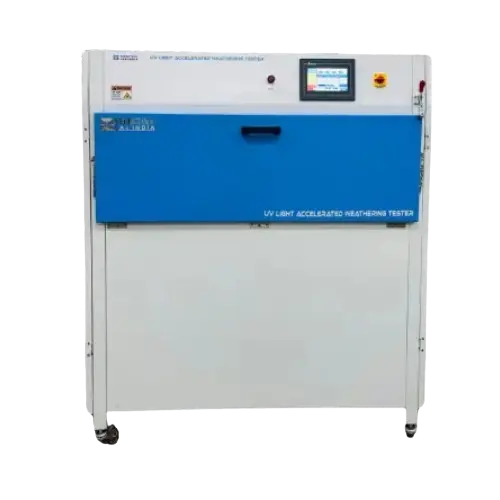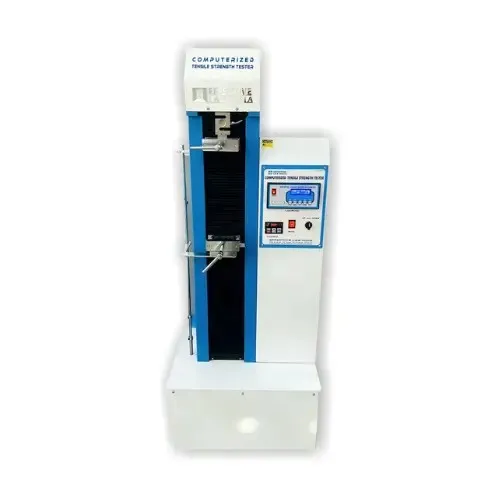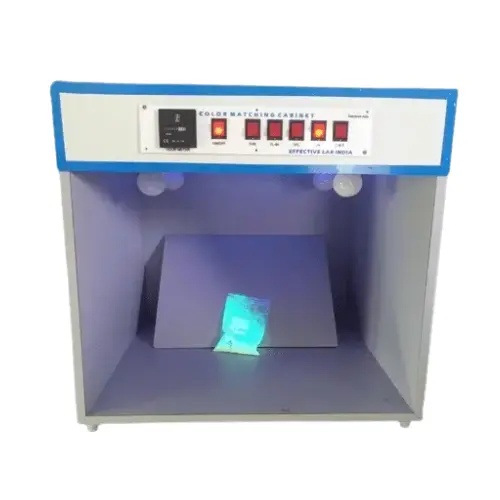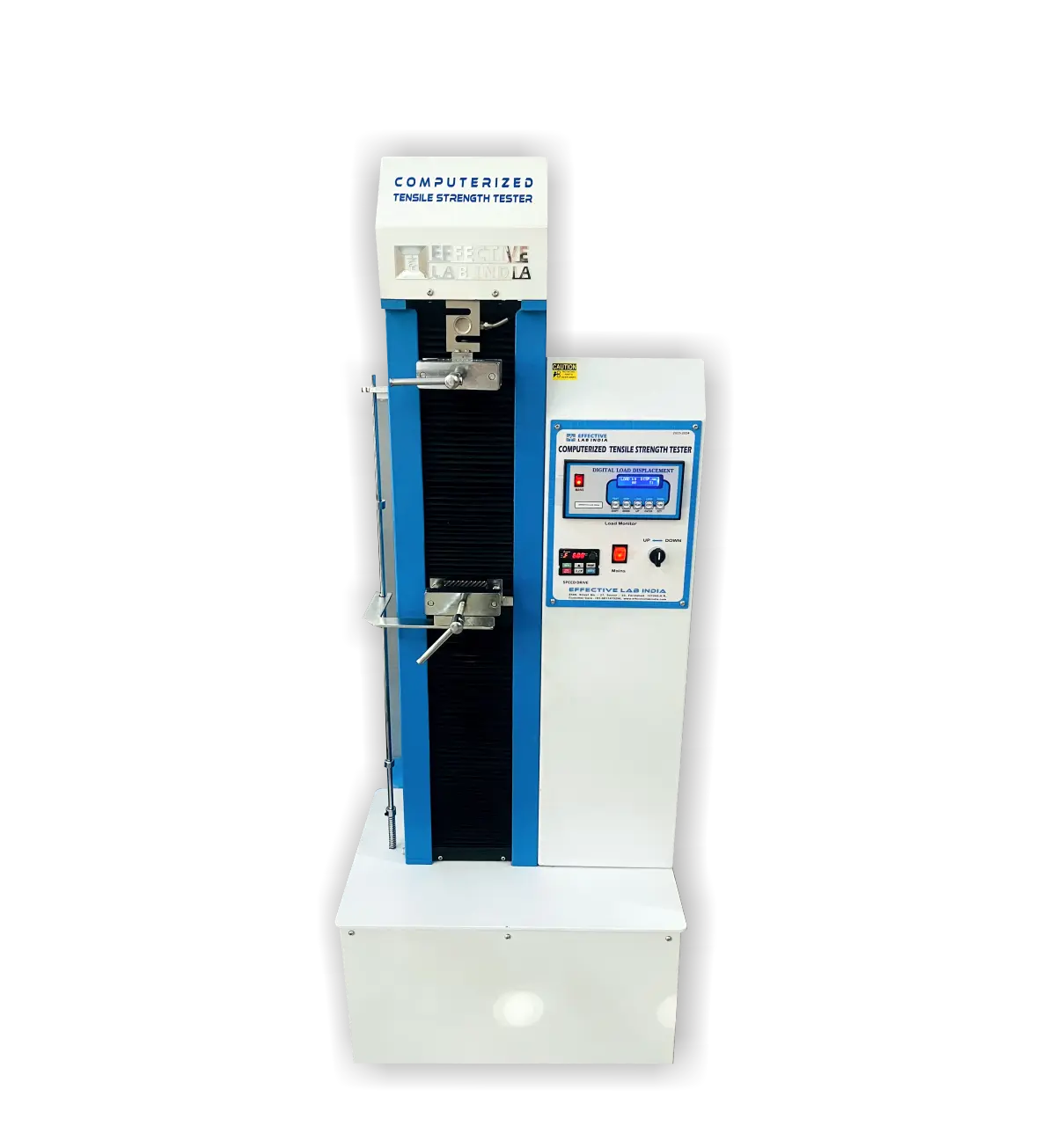Tensile Testing Machine Digital Cum Computerised
Tensile Strength Tester Manufacturer in India
The Tensile Strength Testing Machine from Effective Lab India is a state-of-the-art device designed to measure the tensile strength of materials with utmost accuracy. Essential for quality control and research, the Effective Lab’s Tensile Testing Machine is indispensable for industries that rely on the mechanical properties of materials. Whether you are in the construction, automotive, aerospace, or manufacturing sector, understanding how to use and benefit from this machine will enhance your product quality and reliability.
A tensile strength tester is a testing equipment which is used for examining the pulling force or maximum tensile of a material. This machine is used to test whether a material sustains before breaking or deforming. this is a machine which is used to test the strength of several materials including metals, textiles and polymers.
However, it is a very beneficial equipment which is used to evaluate the strength and suitability of a material for different uses.
Model ELI- TTMDCC
What is the Working Process of a Tensile Strength Tester?
A tensile testing machine works by clamping a material sample between two grips. During this mechanism, one grip remains stationary while the other is being pulled away steadily.
In this work, a Tensile force is applied to the material as the grip pulls on it while causing it to stretch until it breaks. The device calculates the corresponding elongation and force used in the material. Moreover, tensile strength, yield strength and other mechanical characteristics of a material are computed by using this data. This process of tensile testing machines helps in the understanding of the behaviour of various materials under tension by researchers and engineers.
How to Use the Tensile Testing Machine?
Using the Tensile Testing Machine is straightforward and user-friendly, ensuring even novice operators can conduct complex tests with ease.
Here are the steps to follow:
- Preparation: Prepare the sample material as per the specified dimensions and standards. Ensure the sample is free from any defects.
- Loading the Sample: Securely place the sample between the machine’s grips. Adjust the grips to hold the sample firmly without causing any pre-test damage.
- Setting Parameters: Input the required test parameters, such as the speed of the test, gauge length, and the type of material being tested.
- Running the Test: Start the machine to begin the test. The machine will apply tensile force to the sample until it breaks. Throughout the process, it will record the force and elongation data.
- Analysis: Once the test is complete, analyze the data to determine the tensile strength, yield strength, and elongation properties of the material.
Test Standards Compliance
Effective Lab India’s Tensile Testing Machine complies with a variety of international test standards, ensuring versatile application across different industries.
These standards include:
- ASTM D638: Standard Test Method for Testing Tensile Properties of Plastics
- ASTM E8: Standard Test Methods for Tension Testing of Metallic Materials
- ISO 527: Plastics – Standard Test for Determination of Tensile Properties
- ISO 6892: Standard Test Methods for Metallic Materials – Tensile Testing.
-
Display Graphical with test data output through
Inbuilt SoftwarePower 220V, Single / Three phase, 50 Hz Accuracy ± 2% at Full Load (with master load) Standard Speed 50-500 mm/min
*Optional through computer softwareGrip to Grip Separation Min 25mm and Max. 700mm
(applicable only with vice type standard grip)Digital load indicator 7 segment LED Display (optional as per request) Drive Mechanism Variable Frequency AC Drive Safety Yes Grippers (optional added based on
requirement)Vice Type (Standard Gripper), Flexural
Compression Plate, Wedge Type, Roller Type
Communication Converter USB / RS 485 Material Mild Steel Finish Powder coated Havel Gray & Blue
combination finish and bright chrome /
zinc plating for corrosion resistant finishDimensions 1125 x 650 x 1550 mm (as per load cell range)
• Advanced load sensor sensing through advanced electronics.
• Speed Control through Variable Frequency drive automation by Graphic user interface PC.
• Highly sensitive load sensor with linearity feature and repeatability
• Cross-head travel length: 800 mm without grips
• Twin column rugged structure
• Safety limit switches for over travel safety
• Hardened lead screws/ball screws for frictionless movement
• Load cell calibrated by NABL approved proving ring/dynamometers
• Advanced Navigation System
• High accurate micro-controller based system controls with integrated software
• User Friendly software with intuitive icons and robust architecture
• Inbuilt hardware/software CD
• Easy Data Management. User programmable product identification, lot no., shape of specimen, company name, operator
details etc.
• USB compatible for high speed data transfer
• Export Test report in excel format
• Print preview of test reports with Zoom Feature available
• Online test run status can be viewed graphically or in raw data form
• Secured working with key protection feature
• Ease of use features: Graph setup, test control wizard, formulae/result calculations, reports, live test panel.
• Graph setup: user defined graph scale/range with Graph Title
• Test Control Wizard to set test parameters like tension, compression, changeable units in Kgs/N/lbs or cm/mm/inch.
• Automatic end test/return to home position through software interface after completion of test.
• Immediate analysis of results after test with complete accuracy & precision.
• Option to email test reports
• Single Test start with one click entry of the mouse.
Get in Touch
Uses of Tensile Strength Tester
There are numerous uses for tensile strength machines in several industries. It is used in assessing the quality and durability of various materials, including textiles, metals, and polymers. Some particular uses of Tensile test equipment are as follows:
1. Quality Control: Before using the materials in production, manufacturers check that the material meets specified strength requirements with the help of digital tensile testing machine. This helps in upholding constant safety and quality standards.
2. Material Selection: Using the apparatus, researchers and engineers can compare the tensile strengths of various materials to determine which are best suited for a given application. For instance, it helps in determining the strength of building materials like concrete or steel when building.
3. Product Development: When producing new materials and products, a tensile testing machine is essential. Engineers can refine and optimize designs by studying how prototypes perform under stress.
4. Research and Testing: This is useful in scientific research for examining the behaviour of materials under certain circumstances. This data helps in the advancement of numerous academic disciplines, the development of new theories, and the understanding of material properties.
However, this is essential to guarantee quality, safety, and innovation in several industries. It is a very beneficial instrument for assessing the durability and dependability of materials.
Importance of Using a Tensile Tester
The Tensile Test Machine is crucial for several reasons:
- Ensuring Material Quality: It helps in verifying the tensile properties of materials, ensuring they meet the required specifications.
- Product Development: Essential for research and development, it aids in the creation of new materials and products.
- Compliance: Ensures that materials and products comply with industry standards and regulations.
- Customer Satisfaction: By guaranteeing the quality and reliability of materials, it enhances overall customer satisfaction.
Applications
The Digital Tensile Strength Tester is widely used across various industries, including:
- Construction: Testing the tensile strength of construction materials like steel, concrete, and composites.
- Automotive: Ensuring the durability and strength of automotive components and materials.
- Aerospace: Testing the integrity of materials used in aircraft and spacecraft.
- Manufacturing: Verifying the tensile properties of materials used in the production of consumer goods and industrial products.
- Research and Development: Used in laboratories for developing new materials and improving existing ones.
About the Manufacturer – Effective Lab India
Effective Lab India is a leading manufacturer of testing and measurement equipment, known for their commitment to quality and innovation. With a focus on customer satisfaction, the company designs and manufactures high-precision instruments that meet the rigorous demands of various industries. Their dedication to excellence has made them a trusted name in the field of material testing equipment.
Tensile Strength Tester Price in India.
Effective Lab India offers competitive pricing for the Tensile Strength Testing Machine, reflecting its advanced features and robust construction. Pricing of a tensile testing machine depends on the specific model, features and manufacturers. So, if you are looking for the best tensile testing machine price in India then you are at the right place at Effective Lab India. The price range for the tensile testing machine by Effective Lab India varies depending on the model and configuration, starting from 100000 INR to 350000 INR.
For more detailed pricing information and to request a customized quote, please contact our sales team directly. You may contact us by email at info@effectivelabindia.com or by phone at +91-9555515525.
FAQ’s
1: What equipment is used for tensile testing?
Ans: Tensile tests are performed on a universal testing machine commonly known as Tensile strength testing equipment.
2: Which steel is used in tensile tests?
Ans: Tor Steel, mild steel and high tensile steel are used in tensile strength testing machines for tensile tests.
3: Why is tensile testing important?
Ans: Tensile testing is important for determining the durability and strength of various materials such as metals, textiles and polymers. Tensile testing provides a new opportunity to discover new alloys, their uses and their qualities in the metal industry.
4: What is the speed of the tensile test?
Ans: The speed of tensile testing for measuring strength and elongation is 5 or 50 mm/min, and for measuring modulus is 1 mm/min.
5: What is the price of Tensile testing equipment in Faridabad, India?
Ans: Tensile strength tester price depends on the manufacturer, quality and model. You need to check which type of tester you need. However, the general price of a tensile strength tester ranges from 100000 to 350000 INR.
Our Related Products
Hot Air Oven
Peel Seal Bond Strength Tester
TP 800 Portable spectrophotometer
Co- Efficient of Friction Tester
Bursting Strength Tester
GSM Round Cutter Machine
Color Matching Cabinet
Cobb Sizing Tester
Laboratory Heat Sealer
GSM Balance- Digital Model
Edge Crush Tester
Box Compression Tester
